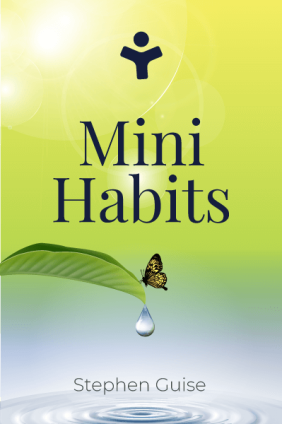
Mini Habits: Smaller Habits, Bigger Results (Mini Habits, #1)
by Stephen GuiseMini Habits explains why many people have difficulty making changes and provides a better solution for staying on track. It introduces the concept of "mini habits," which are small steps that you can take to achieve big goals. Drawing from the author's own life-changing experience, this book will inspire you to take action and achieve your goals, one mini habit at a time.
Automating Behaviors for Personal Growth
Repetition and reward are the two main components of successful habit change. And the human brain is divided into two parts that play a key role in it: the conscious and the subconscious brain.
The subconscious brain, or basal ganglia, is a "stupid repeater" wired for efficiency and pattern recognition. Basically, it makes it easy for us to do things automatically.
The conscious brain, or the prefrontal cortex, on the other hand, is the "smart manager" that is responsible for decision-making and short-term thinking. It is part of the brain that understands long-term benefits and consequences, and it has the ability to override the basal ganglia.
In Lhermitte's study on people with damaged frontal lobes, the importance of the prefrontal cortex's executive function was shown. This function plays a crucial role in preventing us from performing undesirable actions automatically.
To create lasting habits automatically, we need to train our brains to desire what the prefrontal cortex deems beneficial. Employing smart strategies to overcome the prefrontal cortex's natural weaknesses is crucial for successfully creating and maintaining habits.
Actions to take
Relying on Willpower to Achieve Success
Motivation and willpower are essential for personal growth. But while motivation can be a powerful force, it is often unpredictable and unreliable, which can make it an ineffective tool for building lasting habits.
If we want to create lasting habits, we need to rely more on willpower than motivation. That's because willpower is a more dependable resource that can be strengthened over time, much like muscle. By scheduling regular opportunities to exercise your willpower, you can develop healthy habits that will become a natural part of your daily routine.
Actions to take
Building Mini Habits
The "Mini Habits" strategy is based on the idea that it's not what we do occasionally that shapes our lives but what we do consistently. Basically, "mini habits" are small, low-effort tasks that can lead to significant results. It's a flexible strategy that's easy to follow and doesn't require much effort.
The beauty of mini habits is that they offer a way to start fresh and make positive changes in our lives. They're great for both abstract and concrete goals, no matter how we're feeling. Taking the first step can be intimidating, but mini habits can help reduce fear and motivate us to get started. Plus, they can increase mindfulness and willpower!
Actions to take
Developing Mini Habits for Big Changes
If you want to make mini habits a part of your life, there are a couple of things you can do to help yourself out. First off, set a daily deadline and a specific cue for your mini habit, so you don't forget to do it. And if you're trying to make a tough decision, it can be helpful to get into an "implemental" mindset and tie some unrelated rewards to certain actions.
Remember that mini habits are a great way to make progress on your goals without draining all your energy and motivation. When you take the necessary steps to incorporate them, you'll be able to strengthen your willpower and momentum and eventually make progress toward your goals.
Actions to take
Overcoming Burnout
Burnout is a common issue when trying to accomplish big goals. Fortunately, mini habits can also help us overcome it.
Here, you start by taking small steps that will eventually help you achieve big goals. For example, if you're aiming to be physically fit, you can start by doing one pushup to get motivated and make progress. It might seem like a small thing, but these mini habits are surprisingly effective.
Actions to take
Don’t just read. Act.



